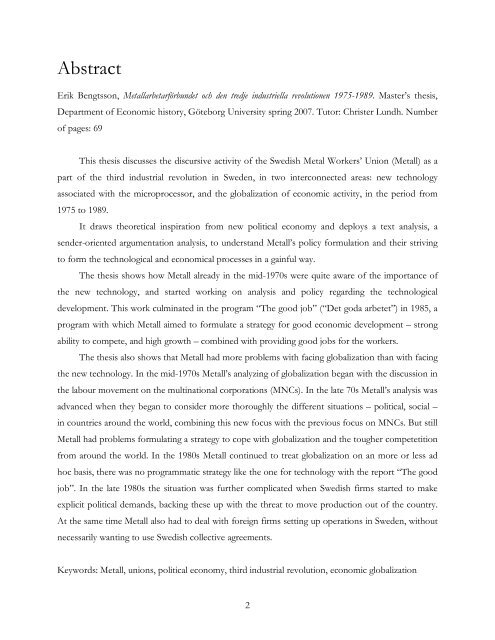Metall och tredje industriella revolutionen - Juhani Kulo
Metall och tredje industriella revolutionen - Juhani Kulo
Metall och tredje industriella revolutionen - Juhani Kulo
Create successful ePaper yourself
Turn your PDF publications into a flip-book with our unique Google optimized e-Paper software.
Abstract<br />
Erik Bengtsson, <strong>Metall</strong>arbetarförbundet <strong>och</strong> den <strong>tredje</strong> <strong>industriella</strong> <strong>revolutionen</strong> 1975-1989. Master’s thesis,<br />
Department of Economic history, Göteborg University spring 2007. Tutor: Christer Lundh. Number<br />
of pages: 69<br />
This thesis discusses the discursive activity of the Swedish Metal Workers’ Union (<strong>Metall</strong>) as a<br />
part of the third industrial revolution in Sweden, in two interconnected areas: new technology<br />
associated with the microprocessor, and the globalization of economic activity, in the period from<br />
1975 to 1989.<br />
It draws theoretical inspiration from new political economy and deploys a text analysis, a<br />
sender-oriented argumentation analysis, to understand <strong>Metall</strong>’s policy formulation and their striving<br />
to form the technological and economical processes in a gainful way.<br />
The thesis shows how <strong>Metall</strong> already in the mid-1970s were quite aware of the importance of<br />
the new technology, and started working on analysis and policy regarding the technological<br />
development. This work culminated in the program “The good job” (“Det goda arbetet”) in 1985, a<br />
program with which <strong>Metall</strong> aimed to formulate a strategy for good economic development – strong<br />
ability to compete, and high growth – combined with providing good jobs for the workers.<br />
The thesis also shows that <strong>Metall</strong> had more problems with facing globalization than with facing<br />
the new technology. In the mid-1970s <strong>Metall</strong>’s analyzing of globalization began with the discussion in<br />
the labour movement on the multinational corporations (MNCs). In the late 70s <strong>Metall</strong>’s analysis was<br />
advanced when they began to consider more thoroughly the different situations – political, social –<br />
in countries around the world, combining this new focus with the previous focus on MNCs. But still<br />
<strong>Metall</strong> had problems formulating a strategy to cope with globalization and the tougher competetition<br />
from around the world. In the 1980s <strong>Metall</strong> continued to treat globalization on an more or less ad<br />
hoc basis, there was no programmatic strategy like the one for technology with the report “The good<br />
job”. In the late 1980s the situation was further complicated when Swedish firms started to make<br />
explicit political demands, backing these up with the threat to move production out of the country.<br />
At the same time <strong>Metall</strong> also had to deal with foreign firms setting up operations in Sweden, without<br />
necessarily wanting to use Swedish collective agreements.<br />
Keywords: <strong>Metall</strong>, unions, political economy, third industrial revolution, economic globalization<br />
2


